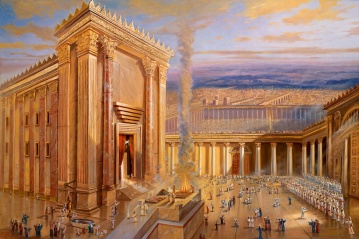“Go up to the hills and bring wood and build the house, that I may take pleasure in it and that I may be glorified, says the Lord.”
Haggai 1:8
WHEN HAGGAI WROTE THESE WORDS, the nation of Israel had returned from Babylonian exile. The temple was in ruins. They began to rebuild it, became discouraged, and quit.
God sent them the prophet, Haggai. His job was to motivate the rebuilding project. The people listened to the prophet and began to build. Eventually they finished the temple.

In the eighth verse of the first chapter God tells them why they should build, “That I may take pleasure in it and that I may be glorified.” Note carefully what motives God did not appeal to. He did not say, “So that you will have a temple in your midst.” He did not say, “So that you will feel secure.” He did not even say, “So that my presence may dwell there and set you apart from the nations.” All of these are valid and previously listed reasons, but they are not the motive that God highlights here. These are centered in human improvement not God’s pleasure. They are not the ultimate reasons for building. The ultimate reason is simple. God wants them to build for his sake, not theirs.
This has direct application to church planters and those revitalizing dying churches. Why should we engage in this work? Here is the ultimate reason: that God may take pleasure in the local church, and that he might be glorified.
What would cause God to take pleasure in a local church? Holiness! God delights in a people persistently growing in godliness or holiness. For this to happen the church planter must excel in at least two disciplines.
The first is the ability to use the word, “No!” He must have a clear vision of what a holy church looks like, and he must be willing to apply the appropriate discipline to take it there. This means he must be willing to occasionally offend people. He must be willing to ruffle feathers. He must be willing to watch people walk away, and that is painful.
“The ultimate reason is simple. God wants them to build for his sake, not theirs.”
The second discipline is gospel centrality. This means the deep and passionate application of the gospel, the kind of application that advances people in holiness. The gospel is about Christ. The gospel is the center of Bible. This means that Jesus should be the hero of every sermon. Paul summed up his ministry this way, “Him we proclaim, warning everyone and teaching everyone with all wisdom, that we may present everyone mature in Christ.” (Col 1:28).
Where do we see the moral beauty of Christ most perfectly displayed? The gospel culminating in the cross! The cross shows us the moral beauty of God. It illustrates and motivates the holiness that glorifies God.
When the glory of God is a church planter’s primary motive, he cultivates the discipline of saying “no.” He focuses his ministry around the gospel culminating in the cross. This leader builds a house that God takes pleasure in. He builds a house that truly glorifies and honors the One who called him. And that is our ultimate goal.
As always, your thoughts are appreciated.
